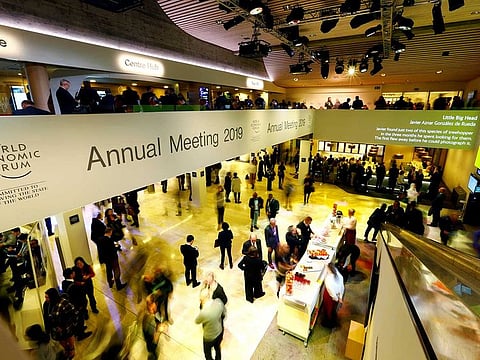UAE provides the good news at Davos summit
These are uncertain times for world free trade, but the UAE shows cooperation can win out

There are strong winds buffeting global trade, with the headwind of tariffs once again posing challenges for those who believe in the essence of free trade and the unfettered movement of goods across our continents. And as the annual World Economic Forum wrapped up in Davos, delegates were left pondering just what forces will shape the global economy in the coming 12 months before they next gather in the quaint Swiss ski resort in 2020.
Certainly, the absence of both China’s President Xi Jinping and US President Donald Trump meant that the two men who will greatly influence the nature and extent of tariffs between the two largest economies provided no new insight into how this potential impediment to continued growth will unfold. And for delegates too The unfolding crisis in Venezuela raised the spectre of further chaos in a nation beset by competing presidencies and the focus of international and internal discord.
One third of the members of the UK’s cabinet turned out at Davos to try and calm international partners, business leaders and political influencers as the prospect of a no-deal Brexit in less than ten weeks’ time looms ever more largely over the global economy. Indeed, should the UK crash out of the European Union without any form of a formal withdrawal agreement, it is an event that may lead to an immediate and sharp contraction of European growth, impacting negatively on nations that together represent the world’s third-largest economy in a common market of more than 500 million people.
Delegates too are worried about the growing rise of populist politics and the move of European nations to the right of the political spectrum – with the upcoming elections for the European parliament at the end of May providing a watershed on that growing movement. Certainly, the neo-liberal and globalist movement that the WEF represents at Davos will be challenged by this right turn.
But the commentary from Davos was far from being negative. Indeed, Dubai’s Crown Prince, Shaikh Hamdan Bin Mohammad Bin Rashid Al Maktoum, provided one of the positives by highlighting the UAE’s efforts to enhance international cooperation and building partnerships to deliver the innovations of the future in the here and now. The UAE is set to lead the region’s contribution to the development of new technologies after an agreement with the WEF to set up an advanced research centre in Dubai. Shaikh Hamdan is determined to develop relations between the UAE and the WEF to establish a new model for knowledge and innovations aimed at ensuring a better future for generations to come. It’s an example others would do well to follow.



